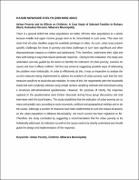| dc.description.abstract | KAJUBI NDWADDE EVELYN (2008-M092-30042)
Urban Poverty and its Effects on Children: A Case Study of Selected Families in Ruharo
Ward, Kamukuzi Division, Mbarara Municipality
There is a general belief that urban populations are better off than other populations as a whole
because middle and upper income groups tend to be concentrated in such areas. This does not
mean that all urban dwellers enjoy the available privileges in cities. As such, urban areas present
specific challenges for those in poverty and these challenges in turn have significant and often
disproportionate impacts on children and adolescents. This, therefore, undermines their right and
their well-being in ways that require particular responses. Owing to this realisation, this study was
undertaken and was guided by the desire to identify the indicators of urban poverty, examine its
causes and how it affects children. All this was aimed at suggesting possible ways of addressing
the problem more holistically. In order to effectively do this, it was so imperative to analyse the
current measures being implemented to address the problem of urban poverty such that the new
measures would try to avoid the past mistakes. In view of this, the respondents were the household
heads that were randomly selected using simple random sampling methods and interviewed using
a structured self-administered questionnaire. However, for purposes of clarity, the responses
captured in the questionnaires were further discussed during focus group discussions and oral
interviews with the local leaders. The study established that the indicators of urban poverty are so
many and greatly vary according to socio-economic, political and geographical settings and so do
the causes. Although a number of measures have been implemented to curb the impact of poverty
on the urban population in Mbarara Municipality, not much success has been registered so far.
Therefore, the study concluded by suggesting a recommendation that for urban poverty to be
holistically addressed, its indicators as well as the causes need to be clearly understood and should
guide the design and implementation of the responses.
Keywords: Urban Poverty, Children, Mbarara Municipality | en_US |


